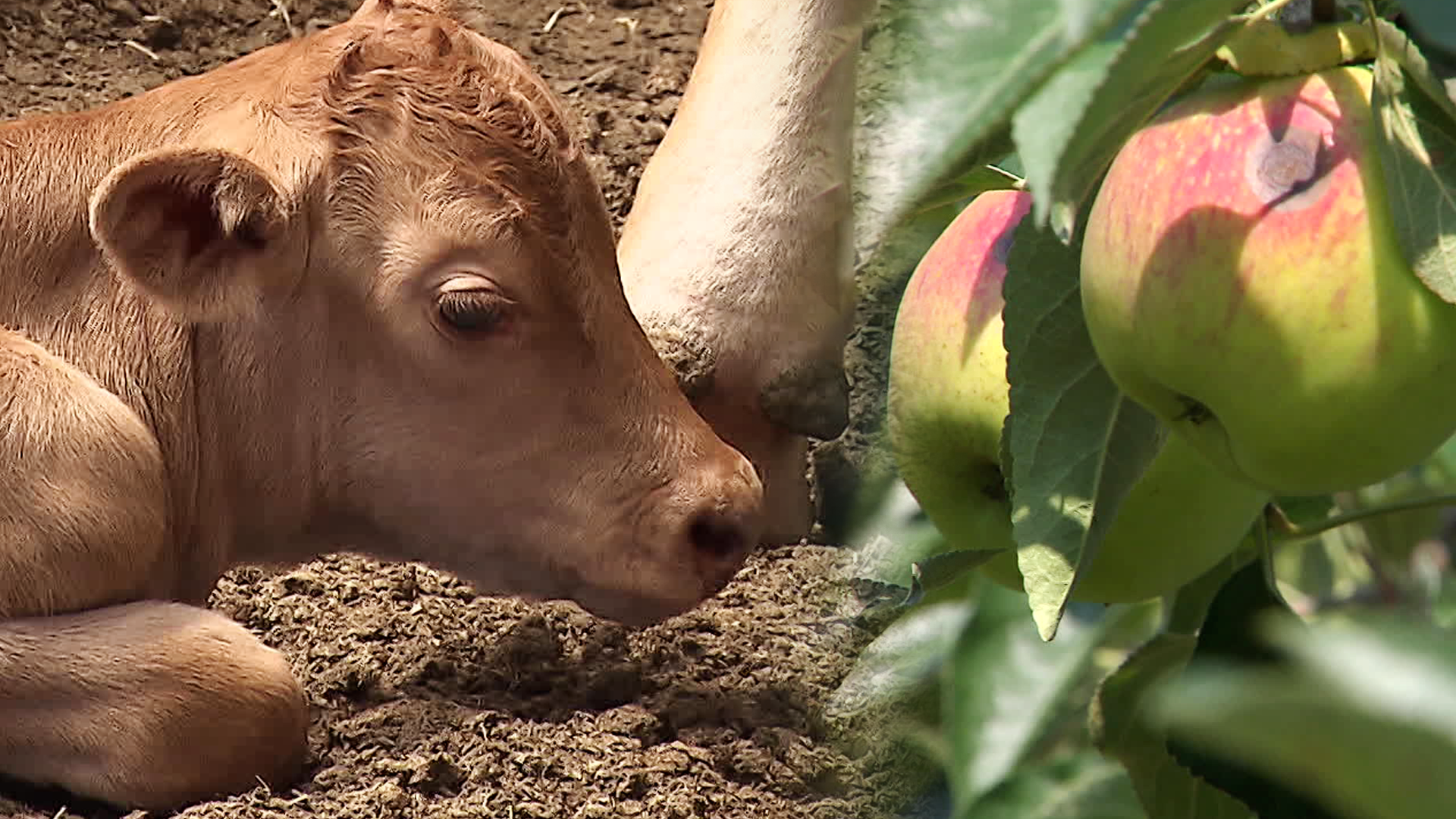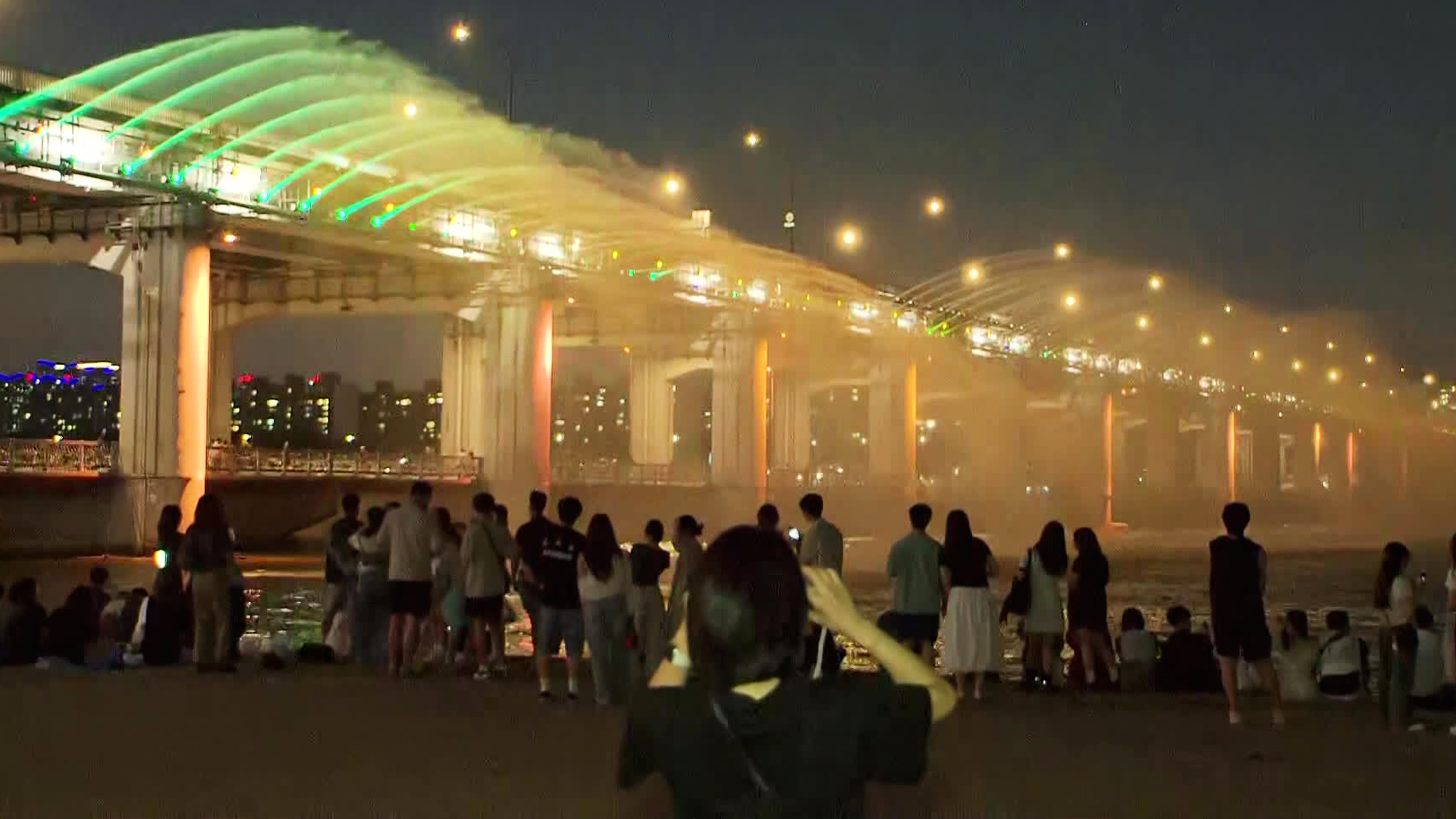[Anchor]
Many people are saying they've lost their appetite due to the extreme heat, and the same goes for livestock.
The heat has caused dairy cows to reduce their feed intake, leading to a sharp decline in milk production.
As seawater temperatures rise, fish in aquaculture farms have also started to show their white bellies.
The livestock and fruit farming sectors are in a state of emergency, and reporter Lee Do-yoon has covered the situation.
[Report]
Apples that have turned brown from sunburn are scattered on the ground.
This is known as sunburn damage, where fruits are harmed by direct sunlight and high temperatures.
[Apple farmer/voice altered: "(Recently) they were damaged by hail, and now with the hot weather, they are burning and breaking."]
Pear yields are also expected to decrease.
These are all fruits that are typically placed on the Chuseok ancestral ritual table, but their quality is expected to be inconsistent compared to usual years.
[Kim Hyung-jin/Head of the Fruit Observation Team, Korea Rural Economic Institute: "This year's apple blooming period was delayed, and due to the low temperatures in May and the early heat wave, growth has been delayed, resulting in smaller fruit sizes so far."]
The greenhouse that was once full of strawberry seedlings is now filled with muddy water.
Due to heavy rain, the harvest time for winter strawberries is expected to be delayed.
[Yu Rak-hyung/Strawberry farmer: "In my opinion, I think it will be at least three years before we can eat them. The seedlings are gone, so that's the biggest problem."]
Livestock farms are also in a state of emergency.
[Cattle farm owner/Hongseong, Chungcheongnam-do: "(Because of the heat) they are eating less, which affects the growth of the cattle...."]
Due to heat stress, the amount of milk produced by dairy cows has decreased by as much as 10%.
The temperature of seawater has also risen, leading to the death of flatfish in Jeju aquaculture farms.
The number of livestock that have died due to the heat has exceeded 1 million, which is more than ten times the number from last year.
The distribution industry plans to stabilize prices and supply of agricultural and livestock products for Chuseok gifts by diversifying production areas.
This is KBS News, Lee Do-yoon.
Many people are saying they've lost their appetite due to the extreme heat, and the same goes for livestock.
The heat has caused dairy cows to reduce their feed intake, leading to a sharp decline in milk production.
As seawater temperatures rise, fish in aquaculture farms have also started to show their white bellies.
The livestock and fruit farming sectors are in a state of emergency, and reporter Lee Do-yoon has covered the situation.
[Report]
Apples that have turned brown from sunburn are scattered on the ground.
This is known as sunburn damage, where fruits are harmed by direct sunlight and high temperatures.
[Apple farmer/voice altered: "(Recently) they were damaged by hail, and now with the hot weather, they are burning and breaking."]
Pear yields are also expected to decrease.
These are all fruits that are typically placed on the Chuseok ancestral ritual table, but their quality is expected to be inconsistent compared to usual years.
[Kim Hyung-jin/Head of the Fruit Observation Team, Korea Rural Economic Institute: "This year's apple blooming period was delayed, and due to the low temperatures in May and the early heat wave, growth has been delayed, resulting in smaller fruit sizes so far."]
The greenhouse that was once full of strawberry seedlings is now filled with muddy water.
Due to heavy rain, the harvest time for winter strawberries is expected to be delayed.
[Yu Rak-hyung/Strawberry farmer: "In my opinion, I think it will be at least three years before we can eat them. The seedlings are gone, so that's the biggest problem."]
Livestock farms are also in a state of emergency.
[Cattle farm owner/Hongseong, Chungcheongnam-do: "(Because of the heat) they are eating less, which affects the growth of the cattle...."]
Due to heat stress, the amount of milk produced by dairy cows has decreased by as much as 10%.
The temperature of seawater has also risen, leading to the death of flatfish in Jeju aquaculture farms.
The number of livestock that have died due to the heat has exceeded 1 million, which is more than ten times the number from last year.
The distribution industry plans to stabilize prices and supply of agricultural and livestock products for Chuseok gifts by diversifying production areas.
This is KBS News, Lee Do-yoon.
■ 제보하기
▷ 카카오톡 : 'KBS제보' 검색, 채널 추가
▷ 전화 : 02-781-1234, 4444
▷ 이메일 : kbs1234@kbs.co.kr
▷ 유튜브, 네이버, 카카오에서도 KBS뉴스를 구독해주세요!
- Heat damages crops and livestock
-
- 입력 2025-07-28 01:03:12

[Anchor]
Many people are saying they've lost their appetite due to the extreme heat, and the same goes for livestock.
The heat has caused dairy cows to reduce their feed intake, leading to a sharp decline in milk production.
As seawater temperatures rise, fish in aquaculture farms have also started to show their white bellies.
The livestock and fruit farming sectors are in a state of emergency, and reporter Lee Do-yoon has covered the situation.
[Report]
Apples that have turned brown from sunburn are scattered on the ground.
This is known as sunburn damage, where fruits are harmed by direct sunlight and high temperatures.
[Apple farmer/voice altered: "(Recently) they were damaged by hail, and now with the hot weather, they are burning and breaking."]
Pear yields are also expected to decrease.
These are all fruits that are typically placed on the Chuseok ancestral ritual table, but their quality is expected to be inconsistent compared to usual years.
[Kim Hyung-jin/Head of the Fruit Observation Team, Korea Rural Economic Institute: "This year's apple blooming period was delayed, and due to the low temperatures in May and the early heat wave, growth has been delayed, resulting in smaller fruit sizes so far."]
The greenhouse that was once full of strawberry seedlings is now filled with muddy water.
Due to heavy rain, the harvest time for winter strawberries is expected to be delayed.
[Yu Rak-hyung/Strawberry farmer: "In my opinion, I think it will be at least three years before we can eat them. The seedlings are gone, so that's the biggest problem."]
Livestock farms are also in a state of emergency.
[Cattle farm owner/Hongseong, Chungcheongnam-do: "(Because of the heat) they are eating less, which affects the growth of the cattle...."]
Due to heat stress, the amount of milk produced by dairy cows has decreased by as much as 10%.
The temperature of seawater has also risen, leading to the death of flatfish in Jeju aquaculture farms.
The number of livestock that have died due to the heat has exceeded 1 million, which is more than ten times the number from last year.
The distribution industry plans to stabilize prices and supply of agricultural and livestock products for Chuseok gifts by diversifying production areas.
This is KBS News, Lee Do-yoon.
Many people are saying they've lost their appetite due to the extreme heat, and the same goes for livestock.
The heat has caused dairy cows to reduce their feed intake, leading to a sharp decline in milk production.
As seawater temperatures rise, fish in aquaculture farms have also started to show their white bellies.
The livestock and fruit farming sectors are in a state of emergency, and reporter Lee Do-yoon has covered the situation.
[Report]
Apples that have turned brown from sunburn are scattered on the ground.
This is known as sunburn damage, where fruits are harmed by direct sunlight and high temperatures.
[Apple farmer/voice altered: "(Recently) they were damaged by hail, and now with the hot weather, they are burning and breaking."]
Pear yields are also expected to decrease.
These are all fruits that are typically placed on the Chuseok ancestral ritual table, but their quality is expected to be inconsistent compared to usual years.
[Kim Hyung-jin/Head of the Fruit Observation Team, Korea Rural Economic Institute: "This year's apple blooming period was delayed, and due to the low temperatures in May and the early heat wave, growth has been delayed, resulting in smaller fruit sizes so far."]
The greenhouse that was once full of strawberry seedlings is now filled with muddy water.
Due to heavy rain, the harvest time for winter strawberries is expected to be delayed.
[Yu Rak-hyung/Strawberry farmer: "In my opinion, I think it will be at least three years before we can eat them. The seedlings are gone, so that's the biggest problem."]
Livestock farms are also in a state of emergency.
[Cattle farm owner/Hongseong, Chungcheongnam-do: "(Because of the heat) they are eating less, which affects the growth of the cattle...."]
Due to heat stress, the amount of milk produced by dairy cows has decreased by as much as 10%.
The temperature of seawater has also risen, leading to the death of flatfish in Jeju aquaculture farms.
The number of livestock that have died due to the heat has exceeded 1 million, which is more than ten times the number from last year.
The distribution industry plans to stabilize prices and supply of agricultural and livestock products for Chuseok gifts by diversifying production areas.
This is KBS News, Lee Do-yoon.
-
-

이도윤 기자 dobby@kbs.co.kr
이도윤 기자의 기사 모음
-
이 기사가 좋으셨다면
-
좋아요
0
-
응원해요
0
-
후속 원해요
0














이 기사에 대한 의견을 남겨주세요.